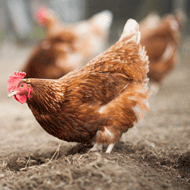Vaccine developed for H5N1 and H7N9

This method could shorten the time it takes researchers to make new vaccines for emerging strains.
US scientists have developed a vaccine for two zoonotic strains of avian influenza, which have resulted in the deaths of hundreds of people and millions of commercial chickens and turkeys.
The team began by transplanting a small section of H5N1 into a cloned vaccine strain of the Newcastle disease virus, which occurs naturally in poultry.
According to research published in the Journal of Virology, tests showed this recombinant virus successfully vaccinated chickens against both H5N1 and Newcastle disease virus.
The same method was used for the emerging H7N9 strain, which has been circulating in China since 2013. Again, the vaccine was found to protect against both viruses.
"We believe this Newcastle disease virus concept works very well for poultry because you kill two birds with one stone, metaphorically speaking," said Jürgen Richt from the US Department of Homeland Security's Center of Excellence for Emerging and Zoonotic Animal Diseases.
"You use only one vector to vaccinate and protect against a selected virus strain of avian influenza."
This method of developing vaccines could shorten the time it takes researchers to make new vaccines for emerging strains of avian influenza, thereby reducing the number and severity of large-scale poultry outbreaks, as well as curbing human transmission.
Professor Richt also believes this method could extend to pigs, sheep, cattle and other livestock. Researchers found they could protect pigs from the H3 influenza strain using the Newcastle disease virus to create a recombinant vaccine.
Co-author Wenjun Ma from Kansas State University is now looking to develop a vaccine for porcine epidemic diarrhoea virus, which has killed around six million pigs.



 The latest
The latest